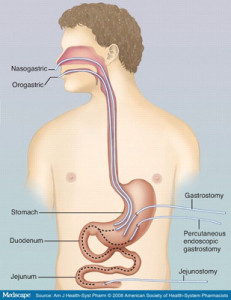Issues to ponder when using an enteral feeding tube to administer medication.
Patients who are unable to swallow due to a debilitating condition are often placed on an enteral feeding tube both for their nutritional needs and for the administration of medication.
There are a few advantages to consider when contemplating the administration of medication through this route such as lower costs as compared to injections, reduced risk of infection, greater convenience and the maintenance of the patient’s gastrointestinal function. On the downside, administration of medicines through enteral tubes has been associated with an increased risk of tube obstruction, increased toxicity and reduced efficacy or effectiveness of the medicines.
Nevertheless, as the practice of giving medicines through the enteral tube becomes increasingly common, it is worth considering some of the following issues.
When administering liquid medicines through the enteral tube, one needs to consider if the liquid is too viscous or “thick” as this can result in the formation of indigestible collections in the patient’s stomach as well as increase the likelihood of the tube being obstructed. While diluting the liquid can be a solution (pun intended), there is limited information on how this may affect the properties of the medicine. Caregivers should also take note of the fact that other types of liquid medicines are not to be given via this route as they are absorbed by the material of the tube.
When administering solid medicines (tablets, capsules) through the enteral tube, there are several issues which the caregiver and the patient’s doctor need to consider. Crushing tablets, if done improperly, can often result in large “chunks” being flushed down the tube and these often result in the tube being completely obstructed, subsequently requiring a replacement tube. Caregivers and doctors must also consider the nature of the medicine contained within the tablet or capsule which is to be crushed or opened and administered through the tube. Many medicines are light-sensitive, moisture-sensitive and acid-sensitive and have been specially formulated into tablets or capsules that protect them until they reach the desired area for action. Crushing or splitting these tablets or opening these capsules can lead to spoilage and renders these medicines ineffective. On the other hand, some medicines are formulated into tablets and capsules in order to protect the patient from their irritant effects and crushing them may expose the patient to these adverse effects.
Another issue to be considered is the effect of the enteral feeds (food given through the tube) on the medicines when both are administered through the same tube. Many medicines are absorbed by the enteral feeds when they come into contact, resulting in reduced amounts of medicine being absorbed by the body. Adding medicines to the enteral feed is also highly discouraged due to the potential of microbial contamination and the stability of the medicines. As such, careful planning of when the patient is given his feeds and when the patient is given his medicines is required to overcome these issues. Proper techniques of flushing and clearing the tube after administering feeds should also be practiced.
In summary, administering medicines through the enteral tube can be convenient for the caregivers of the chronically ill patient who cannot swallow. Proper techniques for preparing the medicines and proper care of the enteral tube must be practiced. Caregivers and doctors should also consult the information leaflet that accompanies the medicines and should any doubt arise, a pharmacist should be consulted to overcome the complications that arise and to ensure the effective use of medicines.
[This article belongs to The Malaysian Medical Gazette. Any republication (online or offline) without written permission from The Malaysian Medical Gazette is prohibited.]


Thoughtful article. For patients unable to swallow and on enteral tubes, but are required to take medication that are light sensitive/acid sensitive/moisture sensitive, what other alternatives are actually there for the patients if it isn’t available in an IV form?
Dear Miza,
Thank you for your question.
To answer your question generally, the first step would be to consider if there are other medication in the same class or can fulfil the same function which could be used as a substitute. If unavailable, the next step would be to consult a pharmacist to explore if the medication can be specially formulated or prepared extemporaneously by the pharmacy to protect it and maintain its efficacy. Special formulations using specific diluents might allow for the administration of medications without significant loss in efficacy.
I hope my answer helps!